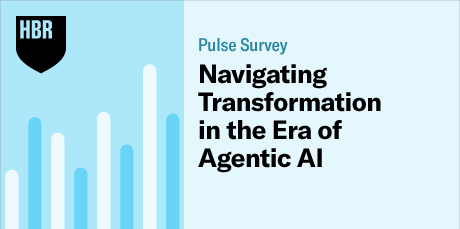HBR research: Agentic AI will reshape business–but only trusted data can make it work.

Harvard Business Review research, sponsored by Reltio, shows why trusted data is the foundation for the age of agentic AI.
A new Harvard Business Review Analytic Services report, Navigating Transformation in the Era of Agentic AI, sponsored by Reltio, explores one of the most consequential shifts in modern business: the rise of agentic AI—intelligent systems that don’t just assist humans but act on their own to make decisions, solve problems, and learn continuously.
For most executives, the potential feels both exhilarating and daunting. According to the survey of more than 400 global business leaders, 91% believe agentic AI will transform the future of work, and 83% say adopting it effectively will be essential to stay competitive. Yet only 38% feel their organizations are well prepared to do so.
That gap between ambition and readiness defines this moment in AI. As Reltio Founder and CEO Manish Sood writes in his sponsor perspective for the report, “Few moments offer as much transformative potential—and as much risk—as the rise of agentic AI.” The technology’s power to reason and act introduces a new level of autonomy, speed, and intelligence into business processes. But as Sood emphasizes, that power depends entirely on the quality of the data behind it.

“Agentic AI cannot succeed without a change in how organizations unify, govern, and operationalize their data. Having a data lake, a data warehouse, or a dashboard is not enough. Agentic AI requires trusted, context-rich data delivered in real time.”
Manish Sood
Founder and ceo

The missing foundation: trusted, unified data
The HBR study confirms what many organizations already sense: the greatest barrier to AI readiness isn’t the model—it’s the data. Nearly four in ten leaders (39%) cite data issues as a top challenge to adopting agentic AI, and another 43% point to cybersecurity and privacy risks tied to how data flows through AI systems.
Most enterprises are still dealing with fragmented, inconsistent, or siloed data across teams and systems. That fragmentation undermines the accuracy and reliability AI needs to reason and act effectively. As Boston University’s Venkat Venkatraman notes in the report, “We’re now creating agent organizations where intelligence needs to be codified so machine agents and humans can sing off the same data page—that’s the foundation for why data is so important for agentic AI.”

“We’re now creating agent organizations where intelligence needs to be codified so machine agents and humans can sing off the same data page—that’s the foundation for why data is so important for agentic AI.”
Venkat Venkatraman
professor

In Sood’s view, this is precisely where companies must focus their investment. Reltio developed the Reltio Data Cloud to serve as the “semantic data layer” that unifies and delivers trusted data at enterprise scale and speed. By combining relationships, transactions, and interactions—not just static records—the platform provides the real-time intelligence that agentic systems need to meet their lofty expectations.
The human side of agentic AI
While technology is advancing rapidly, readiness isn’t just a technical issue. It’s also about people, skills, and governance. The report reveals that many organizations struggle with a lack of talent capable of working with AI, and lack a clear strategy for adoption. Meanwhile, about one-third say they have adequate guardrails in place to mitigate the risks of AI agents acting independently.
This underscores Sood’s call for a broader transformation—one that extends beyond AI tools to include the infrastructure, policies, and organizational mindset that support them. “While AI will shape the future of businesses,” he writes, “the winners will be those who understand the essential role of data and make the necessary strategic investments in technology and organizational structures to transform.”
Preparing for the next wave
The shift to agentic AI will not be incremental. It represents a new stage in automation and augmentation, one in which machines and humans collaborate to unlock new forms of value. To prepare, leaders must ensure their data is complete, connected, and trustworthy—and rethink how their organizations operate around it.
The message from the HBR report is clear: agentic AI can’t deliver its full potential without a foundation of trusted data. For forward-thinking enterprises, the opportunity lies not just in experimenting with AI but in reengineering their data to make it work.
“The potential of agentic AI can only be unlocked with trusted data delivered at an unprecedented scale and speed,” Sood writes. “Precision, accuracy, and speed—those are what will separate the winners from the rest.”
As companies race toward an AI-driven future, the lesson is simple but urgent: before AI can act with intelligence, enterprises must act with intention—starting with their data.
Download the full Harvard Business Review Analytic Services, Navigating Transformation in the Era of Agentic AI, report, sponsored by Reltio, to explore how business leaders are preparing for this new era.